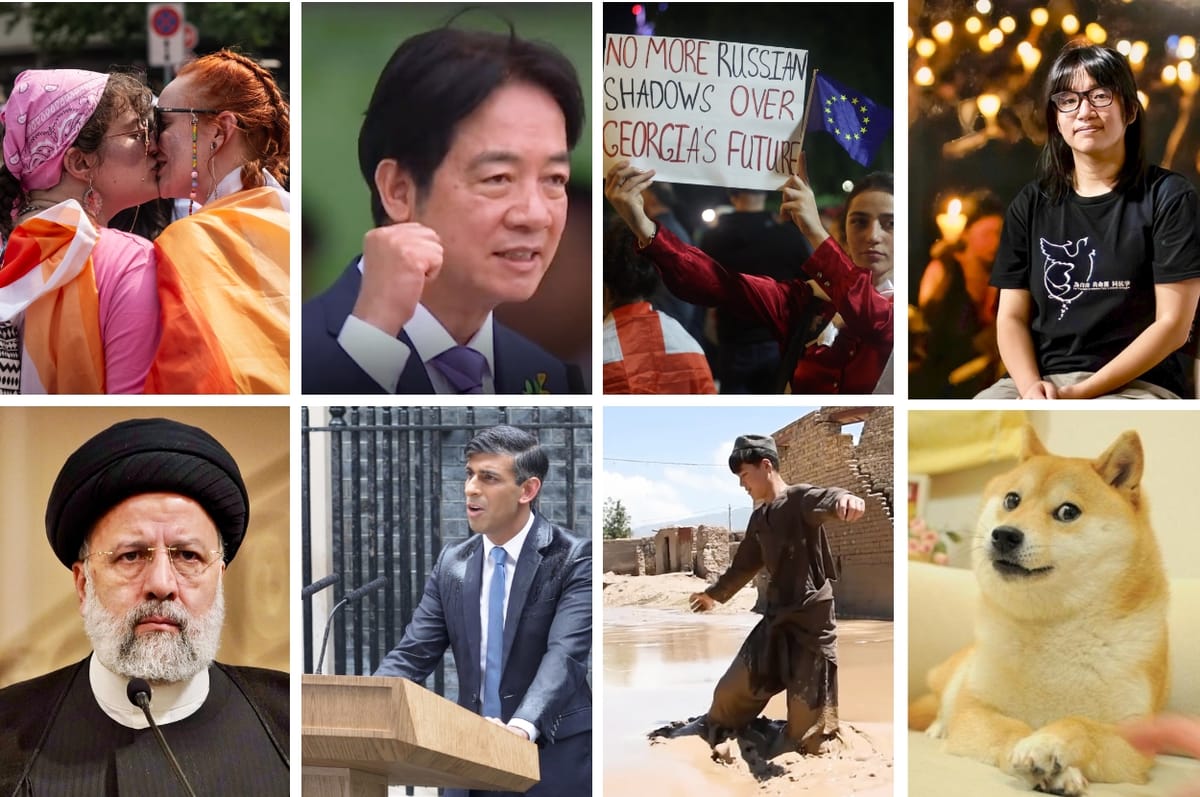Here’s What Happened Around The World In July 2024
Take a look back at some of the major global news events that happened in July 2024.

Take a look back at some of the major global news events that happened in July 2024.
1. Russia bombed Ukraine’s largest children’s hospital and several cities, killing at least 41 people
In one of its deadliest attacks in almost four months, Russia bombed Kyiv's main children's hospital and other cities in Ukraine, killing at least 41 people, including children, and injuring nearly 170.
On Monday, July 8, Russia launched a missile attack on five Ukrainian cities, including Kryvyi Rih, Pokrovsk and Dnipro.
The attack, which took place during the morning rush hour, involved about 40 missiles.
More than 100 buildings were damaged, including the children's hospital, a maternity center in Kyiv, children's nurseries, a business center and residential homes, Ukrainian President Volodymyr Zelenskyy said.
At least four people were killed and 16 were wounded at Okhmatdyt hospital, Ukraine's largest children's hospital known for treating cancer, where many children had been residing for months.
2. Bangladeshi students began holding mass protests for equal job opportunities despite police killing 170 protesters
Student protests broke out across Bangladesh after the government reinstated a law that would reserve 30% of government jobs for veterans and their relatives on June 5.
Prime Minister Sheikh Hasina's government had scrapped the quota system in 2018, but a court reinstated it last month.
The quota system reserved a certain percentage of government jobs for certain people, including marginalized groups such as women, Indigenous people, people with disabilities and children of veterans who fought in the war for Bangladesh’s independence from Pakistan in 1971.
Protesters say the quota decreases the number of government jobs, which pay higher than private sectors, for people who want to fill the positions based on merit.
They also say that the quota for veterans and their families favors supporters of the prime minister’s party, which had led the fight for independence.
Police started violently cracking down on protesters to put an end to the protests, mass arresting people and using batons, tear gas, rubber bullets and live ammunition to disperse the gatherings.
At least 139 people have been killed and thousands have been injured in the police’s violent crackdown.
On July 21, the Supreme Court ruled to scale back the quota system so that candidates will be hired based on merit.
3. After 14 years, the UK voted out the conservative government and elected a center-left leader
People in the UK have voted out the conservative government and overwhelmingly elected a center-left prime minister, bringing an end to 14 years of Conservative Party rule.
Keir Starmer, the 61-year-old leader of the Labour Party, will assume office as the next prime minister of the UK after outgoing prime minister Rishi Sunak conceded defeat in the country’s general elections on Thursday July 4.
The Labour Party stormed to power in a landslide victory by securing more than 400 seats, surpassing the 326-seat majority mark in the 650-seat parliament, results showed on Friday, July 5.
On the other hand, Sunak’s Conservative Party managed to secure only around 112 seats.
Voters had rejected the Conservative Party due to factors such as the cost-of-living crisis, ongoing instability, and internal disagreements within the party, worsened by the turnover of five different prime ministers since the Brexit vote in 2016.
Starmer has pledged to address issues such as prioritizing economic growth, not raising taxes, fixing the UK’s National Health Service, improving education and investing in renewable energy.
4. People in France also rejected the far-right and elected a new left-wing alliance in a shocking win
In a shocking election, People in France have rejected the far-right and elected a new left-wing alliance that was formed just one month ago.
The left-wing New Popular Front (NFP) was only formed in June after President Emmanuel Macron called snap elections.
The far-right party had been expected to win as it got the majority of votes in the first round of elections.
But to everyone’s surprise, the NFP won the most seats in the parliamentary election on July 7.
The NFP was formed on June 10, just 20 days before the election, to stop the far-right from winning the majority in parliament.
It ran on a campaign of raising the minimum wage, lowering the retirement age and freezing the prices of food, energy and gas
The NFP won with 182 seats, leaving Macron’s centrist Ensemble in second place and the far-right National Rally (RN), in third place.
However, forming a government will be challenging as none of the parties won the majority, and although the NFP won the most votes, it does not have a clear leader.
6. The Paris Summer Olympics began despite several controversies, with the Netherlands allowing a convicted child rapist to represent the country
The Netherlands is allowing a convicted child rapist to represent the country at the Paris Olympics, causing a huge controversy.
29-year-old Steven van de Velde will play on the Dutch men’s beach volleyball team at the games in July.
In August 2014, van de Velde, who was 19 at the time, flew from Amsterdam to England to meet with a 12-year-old girl he had met on Facebook.
He gave the girl alcohol when her mother was out and then raped her several times.
He was found guilty of rape, sentenced to 4 years in prison and placed on the the UK’s sex offender registry for life.
After serving only one year of his sentence, van de Velde was transferred back to the Netherlands and released shortly after according to Dutch law.
The federation has defended its decision to let van de Velde represent the country at the Olympics, saying he has proved to be “an exemplary professional and human being”.
7. France banned its women athletes from wearing the hijab at the Games
France is banning women athletes from wearing the hijab at the Paris Olympic Games, causing controversy.
In Sep. 2023, the French sports minister, announced that none of France's Olympic team athletes will be allowed to wear the hijab during the 2024 Olympics.
France has banned girls from wearing the hijab in schools since 2004, and in 2010, it banned full face coverings in public.
The French government said these bans are because the country needs to uphold secularism, which is the separation of religion and the state.
The principle of secularism came from the French Revolution, which sought to weaken the power of the Catholic Church in public life.
The hijab ban at the Olympics has caused a controversy because the International Olympic Committee had branded Paris as the "first gender equal Olympics".
8. And Paris’ mayor swam in the Seine river to prove it’s clean for the Olympics after people threatened to poop in it
Anne Hidalgo, Paris’ mayor, swam in the once heavily polluted Seine River to prove that it is clean and safe for athletes to swim in at the 2024 Olympics.
On Wednesday, July 17, Hidalgo put on a wetsuit and swimming goggles and carefully entered the Seine River from a ladder , while officials, athletes, and locals cheered.
Several top government officials, including the president of the Paris 2024 organizing committee, Tony Estanguet, local club swimmers and reporters, were also invited to join her in the swim.
On June 23, the original date she and French President Emmanuel Macron said they would swim in the river, people made the hashtag #jechiedanslaSeine (#ImPoopingInTheSeine) trend as they threatened to hold a large-scale protest by pooping in the river.
“The Seine is exquisite,” Hidalgo said from inside the river.
“The water is very, very good. A little cold, but not so bad,” shesaid after coming out from the water.“Today was a dream. A testimony that we have achieved a lot of work, and look at the joy, the joy around us.”
9. Japan's women's gymnastics team captain also withdrew after she was revealed to have smoked and drank alcohol
The Japanese Gymnastics Association (JGA) announced in a press conference on Friday, July 19, that 19-year-old Shoko Miyata would not compete after an investigation found she had smoked and drank alcohol.
The legal age for both smoking and drinking in Japan is 20.
However, the Japanese Gymnastic Association's code of conduct bans both activities for all gymnasts, regardless of their age.
The association said that “both parties discussed the matter” and that Miyata had decided to withdraw.
Miyata, who has since arrived back in Japan, has deleted her X account and all her posts on Instagram.
10. The Olympics organizers apologized after South Korea was introduced as North Korea during the opening ceremony
The organizers of the Paris Olympics have apologized after South Korea was mistakenly introduced as North Korea in both French and English during the opening ceremony on Friday, July 26.
As the South Korea boat sailed down the Seine River, both French and English announcers introduced the team as the “Democratic People’s Republic of Korea”, which is the official name for North Korea.
However, the banner at the bottom of the TV broadcast displayed the correct name, which is the “Republic of Korea”.
The North Korean team was then also introduced as the “Democratic People’s Republic of Korea” later in the ceremony.
The Olympics has since issued an apology in Korean on its X account, writing, “We would like to offer a deep apology over the mistake that occurred in the introduction of the South Korean delegation during the opening ceremony.”
11. Religious groups got upset over a scene in the opening ceremony they said parodied the “Last Supper”
The Paris Olympics organizers have been forced to apologize after Catholic and Christian groups were outraged by a performance at the opening ceremony that the groups said parodied “The Last Supper”.
As part of the opening ceremony on the Seine, drag queens, a transgender model and French singer Philippe Katerine, posing as a semi-nude blue Dionysus, the Greek god of wine, stood around a long table.
Many Catholic organizations around the world criticized the moment, calling it a parody of the Last Supper, as depicted in Leonardo da Vinci’s painting of the same name.
The French Bishops’ Conference called it “scenes of mockery and derision of Christianity”, a sentiment echoed by Archbishop Sicicluna, an official for the Vatican, as well as the conservative right in America.
12. Organizers apologized after it played Sudan’s national anthem for South Sudan’s men’s basketball team
Paris 2024 Olympics organizers played the wrong national anthem ahead of South Sudan’s Olympic debut in men’s basketball.
South Sudan gained independence from Sudan in 2011 after decades of civil war.
Instead of hearing « South Sudan Oyee!” , players and fans heard the national anthem of Sudan being played.
In a clip of the moment, the South Sudanese players can be seen preparing for the anthem before becoming visibly confused.
The audio track is then abruptly cut off to boos from the crowd.
An announcer can then be heard apologizing for a “technical error.”
Spectators can then be seen clapping in support of the South Sudanese players until the correct anthem began to play.
Olympic organizers immediately released a statement, citing human error.
13. There were still wholesome moments, like athletes trying everything to break the “anti-sex” cardboard beds at the Olympic village
Paris 2024 Olympic stars from all around the world are taking to TikTok to debunk the that myth that the cardboard beds at the Olympic Village are "anti-sex" by jumping up and down on their beds.
First introduced during the 2020 Tokyo Olympics as part of the Olympics’ commitment to a more sustainable games, the bed frames of the athletes' beds, which were created by Japanese company Airweave, are made out of cardboard that can be recycled.
Athletes in Paris are sharing videos of themselves jumping and somersaulting on their beds to disprove the idea that the beds will break.
14. And numerous breakout stars like this pregnant Egyptian fencer, South Korea and Turkey's Air Pistol Shooters, Pommel Horse Guy And Chile's 58-Year-Old Mom Table Tennis Player.
15. Gambia tried make female genital mutilation – or FGM – legal but failed.
Gambia’s attempt to make female genital mutilation (FGM) legal has failed.
FGM is a procedure that involves removing all or parts of the female genitalia for non-medical reasons.
The procedure is dangerous and has no health benefits, with some girls bleeding to death or dying from infections.
FGM has been banned in Gambia since 2015, with prison sentences of up to three years.
But in March, lawmakers voted overwhelmingly in favor of a new bill to reverse the ban.
The bill was proposed by a lawmaker who said it would help to “uphold religious loyalty and safeguard cultural norms and values”.
But on Monday July 15, the majority of lawmakers voted to strike down the bill and uphold the ban.
16. Brazil made it no longer a crime for adults to have cannabis for personal use
Brazil’s top court has decriminalized possessing cannabis for recreational use, making it one of the last Latin American countries to do so.
Under the ruling, which came on Wednesday, June 26, possessing small quantities of weed will no longer be considered a crime.
Brazilians over 18 can now possess 40 grams of weed or about 80 joints.
However, selling cannabis still remains a crime and consuming it in public is prohibited.
17. Peru will stop labeling trans people as having a mental illness
Peru will stop labeling trans people as having a mental illness.
It comes after hundreds of people protested against a new law approved by the government.
The law specified that trans people, people who cross dress or have “gender identity disorders” are considered to have mental illnesses so they can be eligible for mental health services.
The government said the new law would ensure trans people have a more complete health coverage.
But the move was widely criticized by the LGBTQ community and rights groups for using outdated and regressive language.
Following the backlash, the government said on Tuesday June 25, that it will no longer refer to trans people as suffering from any disorder.
18. This Dubai princess divorced her husband via an Instagram post in a savage yet iconic move
Sheikha Mahra, one of the daughters of the ruler of Dubai, appears to have divorced her husband via an Instagram post in what many are hailing a savage yet iconic move.
“Dear Husband, As you are occupied with other companions, I hereby declare our divorce.
“I divorce you, I divorce you, and I Divorce you. Take care. Your ex-wife,” Sheikha Mahra bint Mohammed bin Rashid Al Maktoum wrote in a post on her verified Instagram account.
In writing “I divorce you” three times, the 30-year-old princess appeared to be invoking an Islamic practice called triple talaq that is usually done by men. The practice, which has been outlawed in several countries including India, Saudi Arabia and Morocco, allowed a man to divorce his wife by saying “enty talaq” – which means “I divorce you” in Arabic – three times.
The princess appears to have also deleted all pictures of her husband, Sheikh Mana bin Mohammed bin Rashid bin Mana Al Maktoum, who is also a member of Dubai’s ruling family, from her Instagram.
The couple had married in May 2023 after becoming engaged in March 2023, and Sheikha Mahra gave birth to their daughter in May 2024.
19. Venezuela’s president challenged Elon Musk to a fight after Musk accused him of winning its elections through fraud
On Monday Aug. 5, Venezuela’s electoral committee announced president Nicolás Maduro had won the recent presidential elections again.
However, the opposition party is challenging the results, saying there was fraud.
Mass protests are breaking out on the streets, demanding the government show a detailed count of the votes.
Meanwhile, Maduro has challenged Elon Musk to a fight and Musk has accepted.
Also Read








